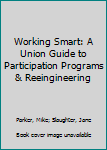Working Smart: A Union Guide to Participation Programs & Reeingineering
No Synopsis Available.
Format:Paperback
Language:English
ISBN:0914093088
ISBN13:9780914093084
Release Date:January 1994
Publisher:Labor Notes
Length:317 Pages
Weight:1.65 lbs.
Related Subjects
Business Business & Investing Catalogs & Directories Economics Education & ReferenceCustomer Reviews
1 rating
An excellent guide to Japanese-style "lean production"
Published by Thriftbooks.com User , 16 years ago
This book was published in 1994 when the impacts of the Japanese extension of "scientific management" -- called kaizen or "continuous improvement" -- was first beginning to have a major impact on management practices in the US. The other reviewer's comments are so misleading I doubt he really read the book. He says that "rigid job definitions" and "rigid work rules" are definitive of "scientific management." This is not the case. Nor has the more recent "lean production" or "reengineering" approach done anything to reduce power of management over workers -- just the opposite. Moreover the industrial engineers who were the architects of Japanese "continuous improvement" were in fact directly inspired by the tradition of "scientific management." The Japanese-inspired extension of "scientific management" has gone under a variety of labels used by management consultants in recent years, includng "lean production", "reengineering", "business process reengineering". What was essential to "scientific management" or Taylorism (after Frederick Taylor) are 1. a reduction in labor expenses through intensification of work effort (speedup), 2. reducing required skill levels, 3. transfer of knowledge, decision-making and control as much as possible to management and away from workers. "Lean production" does in fact require very detailed step by step instructions for jobs. In that respect, it is perfectly consistent with the older Taylorism. "Lean production" does emphasize the idea of workers being able to do a multiplicity of tasks. This is not inconsistent with Taylor's principles however because all the tasks are simplified, de-skilled jobs. The use of teams is also not inconsistent with Taylorism because management finding out from workers what workers have learned about the job was actually something Taylor emphasized, and teams function as a way to do this. Teams are mainly used to involve workers in figuring out how to cut the time they take to do their jobs. A limitation of this book is that Parker and Slaugher mainly focus on auto factories to illustrate their discussion. What has happened since this book was published in the early 1990s is increasing extension of "lean production" or "reengineering" to office, retail and service work. The big increase in investment by companies in computers and software is related to this. There is some discussion of this (for example in the case of hospitals) in this book. But I would recommend reading this book together with an even more excellent, more recent book, "The New Ruthless Economy" by Simon Head.




